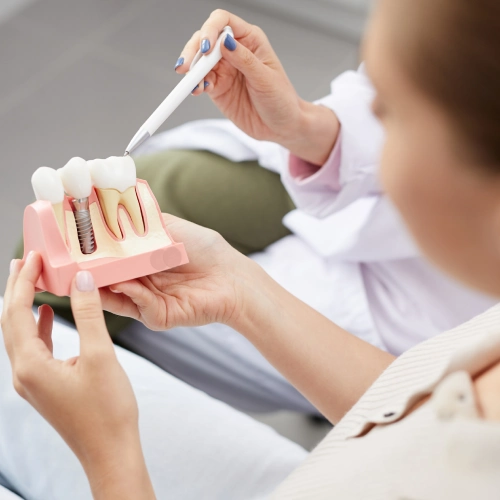Dentures are a popular solution for individuals dealing with tooth loss, offering a way to restore their beautiful smile and ability to eat and speak comfortably. However, traditional dentures often come with challenges such as slipping, discomfort, and difficulty chewing certain foods. Thankfully, advancements in dental technology have paved the way for the development of implant-supported dentures, which provide a more stable and comfortable alternative.
In this comprehensive guide, we'll explore how implants stabilize dentures and restore bites, giving you the confidence and functionality you deserve.
Implant-supported dentures are dental prostheses that rely on dental implants to offer stability and support. Unlike conventional removable dentures that sit on the gums and depend on adhesive for stability, implant-supported dentures are firmly anchored in the jawbone by dental implants placed surgically.
These dental implants serve as anchors for the dentures, allowing them to be firmly attached to the jawbone. Implant-supported dentures are commonly used in cases where a patient has lost multiple teeth or requires full arch replacement. They offer several advantages over traditional dentures, including improved stability, comfort, and functionality.

Implants work by integrating with the jawbone to serve as artificial tooth roots. Implants are implanted into the jawbone, where they fuse over time, providing a sturdy foundation for replacement teeth or dentures. This fusion process, called osseointegration, ensures that implants become a permanent part of the jawbone, allowing them to support various dental prostheses securely. Through this mechanism, implants stabilize dentures and restore the natural function of the teeth and bite.
Some benefits of Implant-supported dentures include-
One of the benefits of implant-supported dentures is improved stability. Since the dentures are attached to dental implants, they are less prone to shifting or moving during eating or speaking, offering a secure and comfortable fit.
Traditional dentures can make it challenging to eat certain foods, particularly harder or tougher items. Implant-supported dentures restore much of the biting and chewing power of natural teeth, allowing individuals to confidently enjoy a wider variety of foods.
Dental implants stimulate the jawbone, prevent bone loss, and maintain the shape of your face, helping you look younger and avoiding the sunken appearance that can happen with regular dentures.
Loose or poorly fitting dentures can make it hard to speak clearly, leading to mumbling or slurred speech. Implant-supported dentures provide a more secure foundation, allowing for clearer and more natural speech.
The process of getting implant-supported dentures typically involves several steps:
During your initial visit, the dentist will check your oral health to see if you're suitable for implant-supported dentures. They will take X-rays and impressions of your mouth to create a customized treatment plan.
The dentist puts the dental implants into your jawbone during a minor surgical procedure. The number of implants needed will depend on the individual's specific needs and the type of denture being used.
After the implants are placed, your jawbone needs time to heal and the implants to bond with the bone. This process, known as osseointegration, typically takes several months.
Once the osseointegration process is finished, connectors called abutments are placed on the implants. These abutments connect the implants to the dentures.
Custom-made dentures are attached to the abutments, providing a secure and natural-looking restoration.
Implant-supported dentures require regular care and maintenance to ensure their longevity and effectiveness. This includes:
Brush and floss every day to eliminate plaque and bacteria from around the implants and dentures.
Make it a habit to visit your dentist regularly for checkups and cleanings. This helps monitor the health of your implants and address any issues promptly.
While implant-supported dentures are more durable than traditional dentures, it's still important to avoid chewing on hard objects or foods that could damage them.
Implants play a vital role in stabilizing dentures and restoring your bite. By providing a secure foundation, implants offer stability, improved functionality, and enhanced confidence for individuals with dentures. Implant-supported dentures can prevent slippage, improve chewing ability, and preserve jawbone health, offering a long-term solution to enhance oral health and overall quality of life.
Ready to experience the benefits of implant-supported dentures? Contact Dental Arts of Florida in Jacksonville, FL, today! New patients can call at (904) 822-9786, while all other callers can call at (904) 416-7047 to schedule a consultation and explore the available options for restoring your bite and improving your smile.
Implant-supported dentures offer greater comfort and stability, eliminating issues like slippage or discomfort often associated with traditional dentures.
With regular care, implant-supported dentures can last a lifetime, providing a strong and lasting solution to restore your smile.
Most individuals are eligible for implant-supported dentures, but candidacy depends on factors such as overall health, jawbone density, and gum health. A consultation with a dental professional can determine suitability for the procedure.

